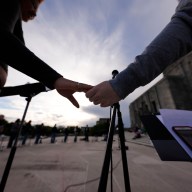 Woody Harrelson converses with Christian Bale in “Out of the Furnace.”
Woody Harrelson converses with Christian Bale in “Out of the Furnace.”
Kerry Hayes
‘Out of the Furnace’
Director: Scott Cooper
Stars: Christian Bale, Casey Affleck
Rating: R
3 (out of 5) Globes
Three films and it’s a trend: This year has seen a trio of high profile dramas with major actors dirtying themselves as low income Northeasterners. First came “The Place Beyond the Pines,” then “Prisoners,” and now “Out of the Furnace,” each convinced that rubbing noses in grit and bad neck tattoos is a shortcut to quality. “Out of the Furnace” goes the furthest into unpleasantness. Not at all coincidentally, it’s the best of the bunch — the only one that would rather be an authentic gutter noir instead of an awards gobbler.
The story is impossible to relate without spoiling major events, but here goes: It starts with Russell (Christian Bale), a blue collar Rust Belt dweller who winds up accidentally killing a family in a car accident. He goes to jail — but that’s not the plot. He’s out in very little screentime, then disappears for most of the second act. Instead it shifts to his brother Rodney (Casey Affleck), a soldier who channels his PTSD into the nasty underground boxing circle and gets involved with a clan of inbred Jersey psychos led by a mumbling Woody Harrelson.
The snaky structure will probably be a liability for many, even for its admirers. Writer/director Scott Cooper (of the more staid “Crazy Heart”) keeps changing his focus. He dwells on events, like Russell’s jail time, that could easily have just been backstory, alluded to in dialogue. He introduces plot strands — like Russell’s beloved (Zoe Saldana), who abandons him during his prison stint — only to leave without resolution.
“Out of the Furnace” isn’t really “about” any one thing, or even about anything at all. It’s all plot — well, plot and mood and a vivid, enveloping, claustrophobic sense of place. Like “The Place Beyond the Pines,” it jerks the audience through a three-part narrative. But the unpredictability of the narrative is even more exciting, in part because it’s less obvious where it will end.
More importantly, it’s less insistent, its characters more internalized, its actors less show-offy. Harrelson is peerlessly ornery, but this is the kind of film where the quieter characters — notably Willem Dafoe’s low-rent, vaguely sad-sack bookie — can sneak in and subtly steal the movie from the flashier roles.
It would be tough making this Oscar-worthy anyway. The worldview is dispassionate, pure red in tooth and claw. It actually has much in common with a film by one of its producers, Ridley Scott’s “The Counselor,” which out-bleaked even the other films based on the work of Cormac McCarthy. Of course, at least that film was funny. This one is so serious it even features the music of Eddie Vedder.
















